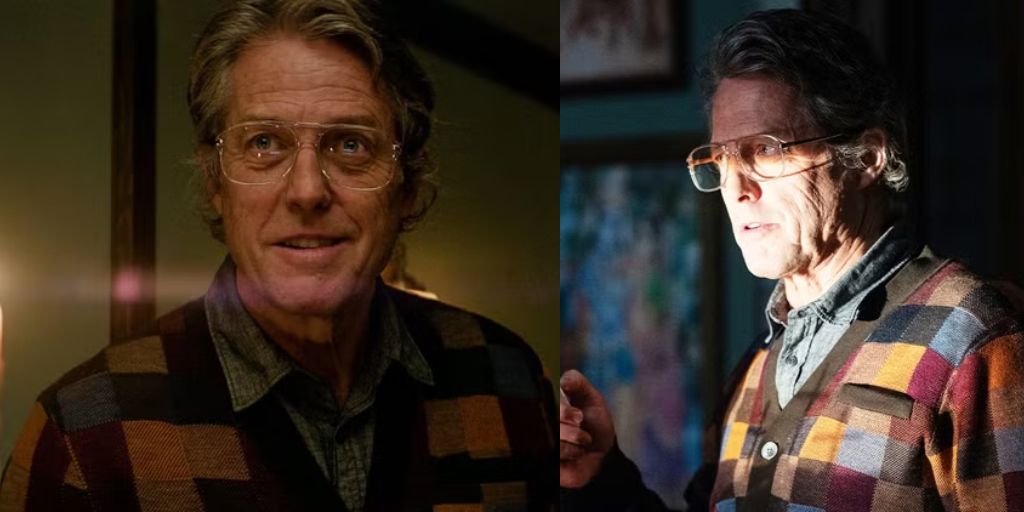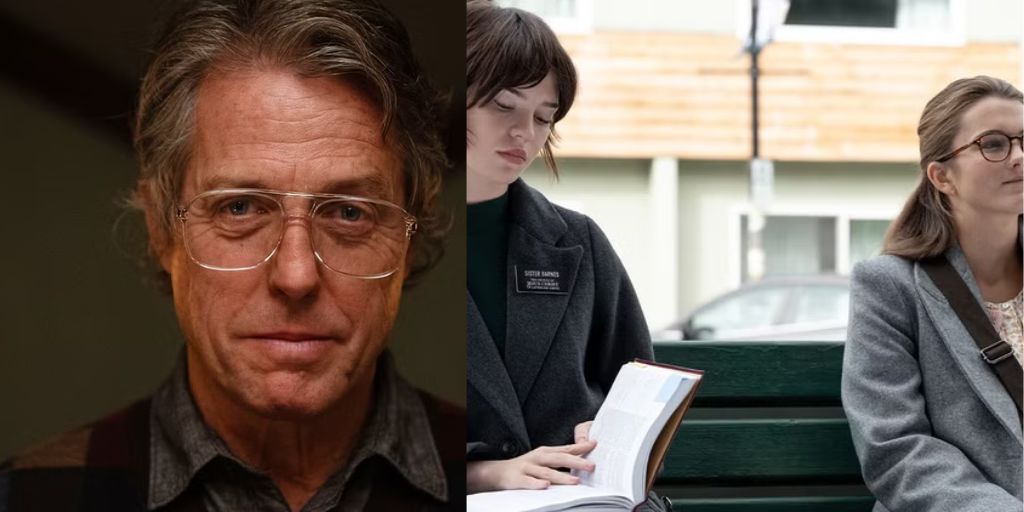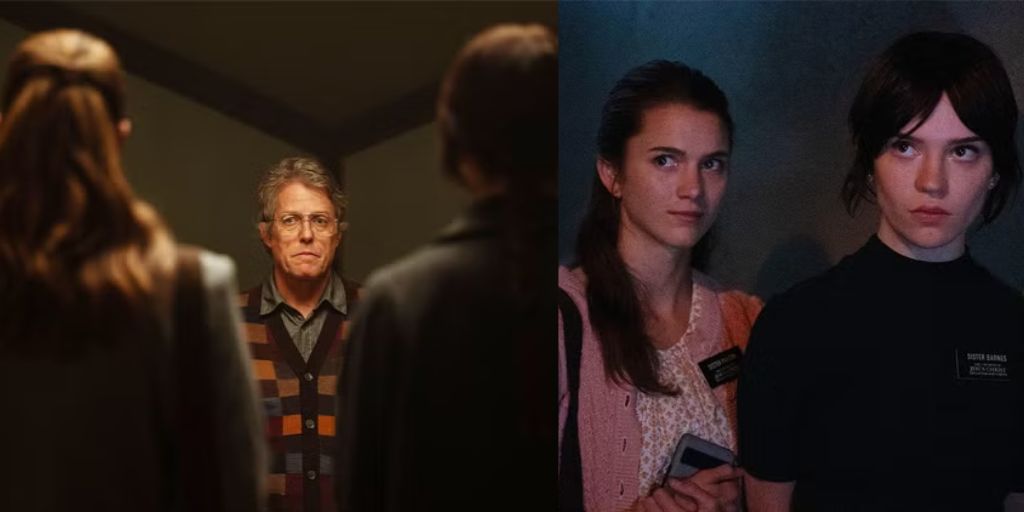Heretic is a psychological horror film by A24 that leaves viewers with a lot to think about, particularly regarding the themes of religion, control, and personal faith. The story is centered on two Mormon missionaries, Sister Paxton (Chloe East) and Sister Barnes (Sophie Thatcher), who find themselves trapped in a house owned by the sinister Mr. Reed (Hugh Grant).
Throughout the film, Mr. Reed forces them to confront their religious beliefs, manipulating them with strange and unsettling scenarios. However, the film does not offer a straightforward answer to the questions it raises about faith. Instead, it presents a deeper scheme of the nature of belief, control, and self-determination.
The film opens with Sister Paxton and Sister Barnes, two young missionaries, being assigned to their new post. They are enthusiastic about their faith and eager to spread their beliefs. However, things take a dark turn when they find themselves caught in Mr. Reed’s home, with no way out. Mr. Reed is an enigmatic and manipulative character, and he has a plan to break the missionaries’ faith.
Throughout the film, he forces them into a twisted game, presenting bizarre tests of faith and belief. The central theme of these tests is the idea of control—Mr. Reed argues that religion is ultimately about controlling people, and he will do everything in his power to convince Sister Paxton and Sister Barnes of this.
Mr. Reed’s Argument: Religion as a Tool of Control
The film reaches a crucial point when Mr. Reed delivers his final argument to Sister Paxton. He claims that religion is merely a tool for control, something that is used by powerful people to manipulate the masses.
He argues that all the missionaries’ faith is built on lies and that their beliefs are based on nothing more than a false sense of security. His proof lies in the so-called “prophets” that he has created, figures who have been kept in cages, malnourished, and manipulated into believing they are divine messengers.
Mr. Reed’s explanation is chilling in its simplicity. He argues that people in a weakened state are easier to control, and this applies to everyone—regardless of religion, status, or power. In his view, every belief system, whether religious or secular, is just a way for those in power to maintain control over the masses.
His argument is terrifying because it suggests that the very thing people hold most dear—their faith—can be twisted into a means of manipulation.
This perspective is reinforced through Mr. Reed’s behavior throughout the film. He does not just argue against religious beliefs; he actively works to break the missionaries down, using every trick he can to undermine their faith.
The scenes involving his “prophets” are particularly disturbing, as they show how far Mr. Reed is willing to go to prove his point. He shows the missionaries the bodies of these men, weak and emaciated, and forces them to confront the idea that the people who claim to be chosen by God are nothing more than victims of manipulation.
Mr. Reed’s final argument represents the culmination of his beliefs. It is here that he makes his most significant statement about control. He insists that religion, in all its forms, is merely a way to keep people in line.
He argues that, like the missionaries, everyone is vulnerable to the same manipulation, and that the idea of a higher power is nothing more than a fabrication to keep people from questioning their place in the world.
Sister Paxton’s Response: Faith and Personal Belief
In response to Mr. Reed’s argument, Sister Paxton stands firm in her faith, offering a powerful counterpoint to his bleak view of the world. Her argument is not just about the truth of religion, but about the importance of personal belief and the power of self-determination.

She tells Mr. Reed that her belief is about her own control, not about forcing others to accept her perspective. Her faith is something that she has chosen for herself, and it is not something that anyone, not even Mr. Reed, can take away from her.
Sister Paxton’s response to Mr. Reed’s argument is one of the most important moments in the film. She acknowledges that her prayers may not always work, but she continues to pray because it is an act of love, not a transaction with a higher power.
This statement reflects a key theme of the film—the idea that faith is not about certainty, but about choosing to believe in something beyond the self. Her belief in prayer, even when it seems ineffective, is a sign of her conviction and her refusal to be controlled by anyone, not even Mr. Reed.
Later in the film, Sister Paxton experiences a moment of symbolic significance. She has previously expressed a desire to be reincarnated as a butterfly, and when she escapes from the house, she finds a butterfly on her finger. At first, it seems like a moment of personal triumph, a sign that her beliefs are being validated.
However, the film quickly undercuts this moment by showing that the butterfly is not real and that Sister Paxton is staring at a lonely, empty finger. This moment reflects the film’s theme of belief versus reality. It suggests that, while what we believe may not always be tangible or provable, it still holds meaning and power.
In a sense, Sister Paxton’s faith is not about proving what is real or not, but about embracing the power of belief itself. Her ability to maintain her faith, even in the face of Mr. Reed’s manipulation, is a testament to the strength of her character. She does not need to convince anyone else of the truth of her beliefs—she simply needs to hold on to them for herself.
Sister Barnes’ Revenge: Shattering Mr. Reed’s Illusion of Control
The final blow to Mr. Reed’s argument comes from Sister Barnes, who seemingly returns from the dead to take revenge on her captor. The scene is dramatic and shocking, as Sister Barnes drives a nailed board into Mr. Reed’s skull, killing him and saving Sister Paxton.
Some viewers may interpret this moment as a miracle, a divine intervention that disproves Mr. Reed’s claims about the impossibility of supernatural occurrences. However, another interpretation is that Sister Barnes’ return is not a miracle, but a result of her sheer will to survive and seek justice.
In this light, Sister Barnes’ return is a powerful symbol of defiance against Mr. Reed’s control. It shows that, even in the face of death, the human spirit can fight back. Mr. Reed’s illusion of control is shattered in that moment, as he is ultimately defeated by the very people he sought to manipulate.
Sister Barnes’ revenge is not just a personal victory, but a repudiation of Mr. Reed’s worldview. It shows that, while we may not have control over everything in our lives, we do have control over how we respond to the challenges we face.
This moment also speaks to the film’s broader themes of resistance and empowerment. Throughout the story, the missionaries are forced to confront their beliefs and their sense of powerlessness in the face of Mr. Reed’s manipulations. But in the end, they prove that they are not entirely at the mercy of others.
Their actions, particularly Sister Barnes’ final act, demonstrate that they have the strength to resist, to fight back, and to reclaim their agency.
The Ending: A Reflection on Control, Belief, and Faith
The ending of Heretic is deliberately ambiguous, leaving viewers with a lot of questions about the nature of faith, control, and the supernatural. Is religion just a means of control? Are we all caught in a cycle of searching for the truth? And most importantly, is there a higher power, or is it all just an illusion?
These are some of the existential questions that Heretic raises, but the film does not provide definitive answers. Instead, it suggests that the answers to these questions may not matter as much as the choices we make in response to them.

The film encourages viewers to reflect on their own beliefs and how those beliefs shape their actions. It suggests that the power of belief lies not in proving what is real or not, but in the way it empowers us to live our lives.
The missionaries in Heretic do not need to prove the truth of their faith to anyone else—they simply need to hold on to it for themselves. In doing so, they find strength, purpose, and agency in a world that often seems indifferent to their beliefs.
Heretic is now playing in theaters in the U.S.




